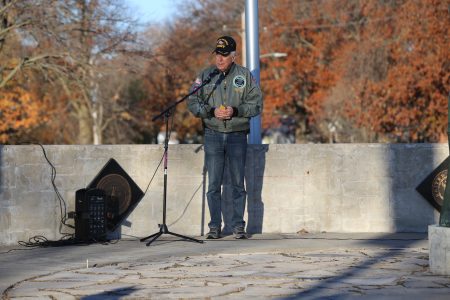Bureau of Indian Education rescinds directive from Haskell president, says it’s committed to free speech

photo by: Chad Lawhorn
Haskell Indian Nations University President Ronald Graham provides closing remarks at a Veterans Day celebration at the university on Wednesday, Nov. 11, 2020.
Story updated at 4:21 p.m. Wednesday:
The director of the Bureau of Indian Education has rescinded directives sent by Haskell Indian Nations University leaders that restricted how employees could communicate, stating that the bureau is committed to freedom of expression.
In a Tuesday letter to Haskell faculty and staff, Tony Dearman, director of the BIE, said a March 11 memorandum from Haskell president Ronald Graham regarding the chain of command and how employees should address issues has been rescinded.
The order to rescind comes after a unanimous vote of no-confidence in Graham’s leadership earlier this month by the Faculty Senate at Haskell.
Graham’s memorandum stated that staff members were required to follow the organization’s hierarchy when problems arose and that, regardless of the issue, “at no time is it ever appropriate for any employee to disclose their issues publicly through the government email system or any other means of mass communication to individuals not directly or specifically a party to the possible resolution.”
Graham had called the directive “non-negotiable” and said employees must conduct themselves in a manner that reflects positively on Haskell. He also wrote that Haskell leadership was committed to professionalism, creating a positive work environment and ensuring the interest of students; he said he had encountered “detractors” of these objectives.
In rescinding the memorandum on Tuesday, Dearman said the BIE was committed to free speech.
“The Bureau of Indian Education is committed to providing Haskell students, faculty and staff the freedom to express themselves on matters of importance,” Dearman wrote.
Dearman also rescinded a March 21 email from Melanie Daniel, Haskell’s vice president of academics. Daniel wrote that Haskell employees did not have the right to speak to the media and mention their Haskell employment unless first receiving approval.
In his letter, Dearman wrote that laws, regulations and standards governing the public communications of Haskell employees could be found in the U.S. Department of the Interior’s manual.
According to the public communications policies in the departmental manual, “employees may speak on behalf of the Department to the news media and the public about their official work and freely and openly discuss scientific, scholarly, technical information, and, approaches, findings, and conclusions based on their official work.” The manual states that employees should indicate whether they are communicating in an official or individual capacity.
When asked to comment on Dearman’s decision to rescind her email, Daniel told the Journal-World the situation was a “non-issue.”
“Mr. Dearman referenced the same Departmental Manual provision as I did in my email,” Daniel wrote in an email to the Journal-World. “I specifically stated that our employees have the right to speak as they wish. He used different verbiage, that is all.”
Graham did not respond to a request for comment regarding the decision to rescind his directive. The Journal-World also sent an email to the media relations team at the Bureau of Indian Affairs and did not receive an immediate response.
The departmental manual that Dearman referenced also states that the Department of the Interior, which operates the BIE, supports a culture of openness with the news media and the public. Graham has not responded to questions from the Journal-World in more than six months.
The editor of Haskell’s student newspaper filed a federal lawsuit in early March against Graham, Haskell Indian Nations University, the BIE and Dearman regarding his First Amendment rights. In October, Graham sent a directive to the editor, Jared Nally, telling him what he could and could not write. It was not until Jan. 13, 2021, that Nally received an undated letter from Graham telling him that the directive had been rescinded.
Earlier this month the Faculty Senate at Haskell took a unanimous vote of no confidence in Graham’s leadership, citing his restrictions on speech and his failure to call any Haskell Board of Regents meetings in his first year and to engage in shared governance.
“President Graham has demonstrated disdain for collegial academic culture and the unique Indigenous character of Haskell, as evidenced in his disregard for academic freedom, the free speech rights of our students and faculty, and by the autocratic manner in which he seeks to run, not lead, Haskell,” the Faculty Senate’s resolution stated.
Graham, a former division dean of instruction at Victor Valley College in Victorville, Calif., began his presidency of Haskell in May of 2020. Prior to his becoming president, Haskell was led by two interim presidents — Jim Rains and Dan Wildcat — for more than a year. Before that, Haskell was led by President Venida Chenault, who left in 2018 to work on special assignment for the Bureau of Indian Education just days after a federal report detailed allegations of misconduct at the university.







